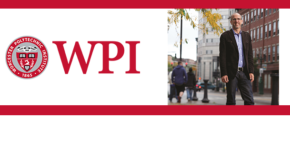Tag: worcester polytechnic institute
-

The Academic Minute for 2024.06.03-2024.06.07
The Academic Minute from 6.03 – 6.07 Monday Kris Wobbe – Worcester Polytechnic Institute Maximizing Learning through High-Impact Practices Kris Wobbe is the Director of WPI’s Center for Project-Based Learning. Most recently she directed the Great Problems Seminar program, WPI’s first-year project’s program. Her teaching awards include the Moruzzi Prize for Innovation in Undergraduate Education,…
-

Lindsey Davis, Worcester Polytechnic Institute – Projects Narrow Self-Efficacy Gaps for Women
Worcester Polytechnic Institute’s Benefits of Project-Based Learning Week: Narrowing self-efficacy gaps for women is crucial. Lindsey Davis, assistant professor of teaching in the humanities and arts department, looks into how projects can do so for female students. I am a broadly trained interdisciplinary scholar of 19th and 20th American history and critical feminist studies. Along…
-

Kimberly LeChasseur, Worcester Polytechnic Institute – Project-Based Learning: More is Better
Worcester Polytechnic Institute’s Benefits of Project-Based Learning Week: Can too much of a good thing be bad for you? Not when it comes to project-based learning. Kimberly LeChasseur, senior research and evaluation associate, examines why. As a Research & Evaluation Associate with the Center for Project-Based Learning, Kimberly LeChasseur focuses on what we know about…
-

Kris Wobbe, Worcester Polytechnic Institute – Maximizing Learning through High-Impact Practices
Worcester Polytechnic Institute’s Benefits of Project-Based Learning Week: Developing high-impact practices for students can be beneficial for institutions. Kris Wobbe, associate professor in the department of chemistry and biochemistry, explains why. Kris Wobbe is the Director of WPI’s Center for Project-Based Learning. Most recently she directed the Great Problems Seminar program, WPI’s first-year project’s program.…
-

Robert Krueger, Worcester Polytechnic Institute – Overcoming the Hubris Problem in Engineering for Development Projects
Providing development projects in foreign countries does not always go as planned. Robert Krueger, professor of human geography at Worcester Polytechnic Institute, determines what changes should be made for future endeavors. Robert Krueger is a human geographer whose scholarship and teaching focus on epistemic and institutional in community sustainable development projects in the global north…
-

Kent Rissmiller, Worcester Polytechnic Institute – Preparing Students with a Project-Based Curriculum
On Worcester Polytechnic Institute Week: Project-based learning can set students up for success outside of school. Kent Rissmiller, associate professor of social science, explores these benefits. Kent Rissmiller completed studies in political science at Muhlenberg College (AB) and Syracuse University (PhD). Along the way, he also completed a JD at the University of New Hampshire…
-

Kristin Wobbe, Worcester Polytechnic Institute – Project-Based Learning in the First Year
On Worcester Polytechnic Institute Week: Students shouldn’t wait for project learning in higher education. Kristin Wobbe, associate professor of chemistry and biochemistry, explains that this type of learning provides benefits from the beginning. Project-based learning is an enormously powerful approach to education. I’ve been changed by it; I’ve watched students be changed by it. I’ve…
-

Geoff Pfeifer, Worcester Polytechnic Institute – Inclusion and Equity in Student Project Teams
On Worcester Polytechnic Institute Week: Not everyone likes team projects in college classes. Geoff Pfeifer, associate teaching professor, discusses one tool that could change that. Professor Pfeifer’s areas of expertise are in social and political theory, social and political philosophy, and social and global justice. As a part of this, he is involved in a…
-

Art Heinricher, Worcester Polytechnic Institute – Cost of Higher Education
On Worcester Polytechnic Institute Week: Is higher education worth the cost? Art Heinricher, professor of mathematical sciences, explains changing how students learn could change the answer of the majority. Arthur Heinricher is the Dean of Undergraduate Studies and a Professor of Mathematical Sciences. As dean, he is responsible for ensuring the quality and effectiveness of…
